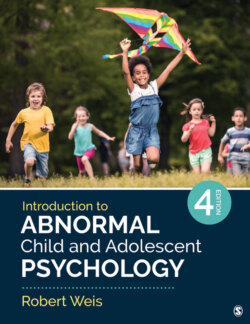Читать книгу Introduction to Abnormal Child and Adolescent Psychology - Robert Weis - Страница 95
На сайте Литреса книга снята с продажи.
Social Learning
ОглавлениеBehaviors can also be acquired by observing others. Albert Bandura and colleagues (Bandura, Ross, & Ross, 1961) demonstrated that children who watched adults behaving aggressively toward a Bobo doll often imitated the adults’ aggressive actions. Bandura’s social learning theory proposed that learning through imitation or modeling was a primary mechanism of behavioral acquisition. Social learning was especially likely when models were similar to children in age and gender and when models were reinforced for their actions.
Modeling is also used to explain and to treat child behavior problems. For example, parents who model anxiety to their children can increase their children’s likelihood of developing an anxiety disorder. A mother who is afraid of social situations might model this fear to her daughter. Specifically, she might avoid attending social gatherings and worry about appearing foolish in public. She might also tell her daughter that other people are critical and judgmental, thereby increasing her daughter’s fear of social situations. As a result, her daughter might develop anxiety and a tendency toward social withdrawal (Knappe, Beesdo-Baum, Fehm, Lieb, & Wittchen, 2012).
A therapist might also use modeling as a means to reduce the daughter’s social anxiety. Specifically, the therapist might ask the child’s teacher to pair the girl with a “classroom buddy”—a female classmate who shows well-developed social skills and is willing to model appropriate social behavior. By watching her “buddy,” the girl might discover that social situations are often pleasant and are rarely catastrophic. Consequently, her social anxiety may decrease (Scaini, Belotti, Ogliari, & Battaglia, 2016).
Review
Classical conditioning occurs when children associate two stimuli together in time. Behaviors acquired through classical conditioning can be extinguished using exposure techniques.
Operant conditioning occurs when children associate a behavior with an environmental consequence. Reinforcement always increases the likelihood of future behavior; punishment always decreases the likelihood of future behavior. Reinforcement and punishment can be positive or negative.
Social learning occurs when children acquire a behavior through imitation or modeling.
